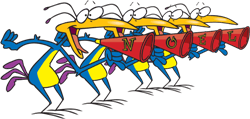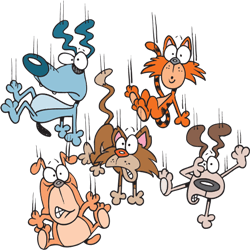Pronombres indefinidos
Indefinido significa "sin un límite fijo" o "ilimitado".
Click Here for Step-by-Step Rules, Stories and Exercises to Practice All English Tenses
Los pronombres indefinidos son pronombres que no se refieren a ninguna persona o cosa en específico.
Primero, repasemos rápidamente los pronombres.
Los pronombres son palabras que reemplazan a sustantivos.
Por ejemplo:

Considera esta oración:
Bill and Jane work in the same office.
(Billy y Jane trabajan en la misma oficina.)
Puedo reemplazar la frase nominal Bill and Jane con el pronombre They.
They work in the same office.
(Ellos trabajan en la misma oficina.)
"They" es un pronombre.
Abajo hay algunos ejemplos de pronombres más:
- who
- myself
- she
- it
- mine
- hers
Pronombres indefinidos
Los pronombres indefinidos son pronombres que pueden ser usados para reemplazar un número ilimitado de sustantivos.No reemplazan a ningún sustantivo específico.
Singular o plural
La mayoría de los pronombres indefinidos son singulares o plurales, pero algunos son tanto singulares como plurales.Veamos algunos pronombres indefinidos de uso común.
Pronombres indefinidos singulares:
- another

- anybody
- anyone
- anything
- each
- either
- everybody
- everyone
- everything
- neither
- nobody
- no one
- nothing
- one
- other
- somebody
- someone
- something
Pronombres indefinidos plurales:
- both
- few
- many
- others
- several

Pronombres indefinidos que pueden ser singulares o plurales (vamos a explicar cómo es posible esto):
- all
- any
- more
- most
- none
- some
- such


A) Los pronombres indefinidos singulares toman un verbo singular o un pronombre personal singular
- Incorrecto:
Each employee have a desk.
- Correcto:
Each employee has a desk.
(Cada empleado tiene un escritorio.)
- Incorrecto:
Everyone like the beach.
- Correcto:
Everyone likes the beach.
(A todos les gusta la playa.)
- Incorrecto:
One of the men forgot their lunch.
- Correcto:
One of the men forgot his lunch.
(Uno de los hombres olvidó su almuerzo.)
Aquí hay algunos ejemplos
más:
-
Everybody enjoys chocolate ice cream.
(Todo el mundo disfruta del helado de chocolate.)
- I ran faster than the other
girl during the race.
(Corrí más rápido que la otra chica durante la carrera.)
-
Someone left a coat in the locker room.
(Alguien dejó un abrigo en el vestuario.)
- I need to eat something
today.
(Necesito comer algo hoy.)
-
Everything is wet from the rainstorm.
(Todo está húmedo por la tormenta.)
- Yes, I will eat one.
(Sí, me comeré uno.)
-
Nobody likes attending funerals.
(A nadie le gusta asistir a los funerales.)
- I don't want anything
on my hamburger.
(No quería nada en mi hamburguesa.)

B) Los pronombres indefinidos plurales toman un verbo plural o un pronombres personal plural
- Incorrecto:
Both was at the wedding.
- Correcto:
Both were at the wedding.
(Ambos estuvieron en el casamiento.)
- Incorrecto:
Few people cast his vote.
- Correcto:
Few people cast their vote.
(Pocas personas votaron.)
Aquí hay algunos ejemplos más:
-
Many people enjoy taking their dogs to the park.
(Mucha gente disfruta de llevar sus perros al parque.)
-
Some like cars more than others.
(A algunos les gustan los coches más que a otros.)
-
Several teachers have applied for the job.
(Varios profesores se han postulado para el trabajo.)
-
Most people like either chicken or steak. I like both.
(A la mayoría de la gente le gusta o el pollo o la carne. A mí me gustan los dos.)

C) Para los pronombres indefinidos que pueden ser tanto singulares como plurales, depende a qué se refiere el pronombre
Ejemplos:
- All
of the employees received their
bonus checks.
(Todos los empleados recibieron sus cheques de bonificación.)
All se refiere a employees, que es plural.

- All
of the drink is
gone.
(Toda la bebida se ha tomado.)
All se refiere a drink, que es singular.

- I replaced the bulbs, but none
are
working.
(Reemplacé las bombillas pero ninguna está funcionando.)
None se refiere a bulbs, que es plural.

- None of
the light is
getting through the blinds.
(Nada de luz está entrando a través de las persianas.)
None se refiere a light, que es singular.

Estos son los usos de los pronombres indefinidos. Ahora que las entiendes, ¡es hora de practicarlas! Lee y haz ejercicios.
Get Updates, Special Offers, and English Resources
Download your FREE GIFT (the first two chapters of
English Short Stories Book and Workbook)
as soon as you join!

By submitting your email, you consent to receiving updates and newsletters from us and to the sharing of your personal data with third parties for the purposes of sending you communications. We will not spam you. You can unsubscribe at any time. For more information, please see our privacy policy.
Volver de Pronombres indefinidos a Pronombres en inglés





